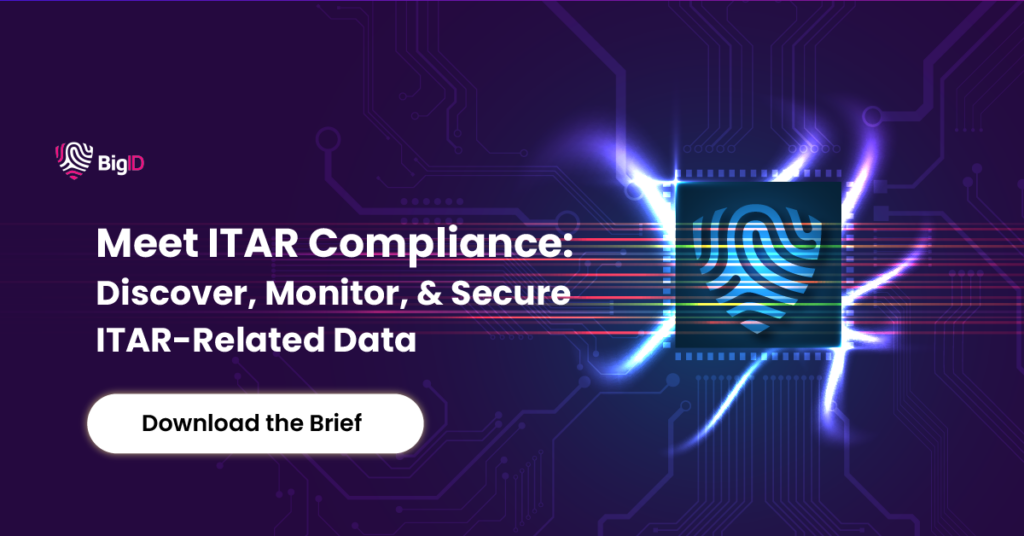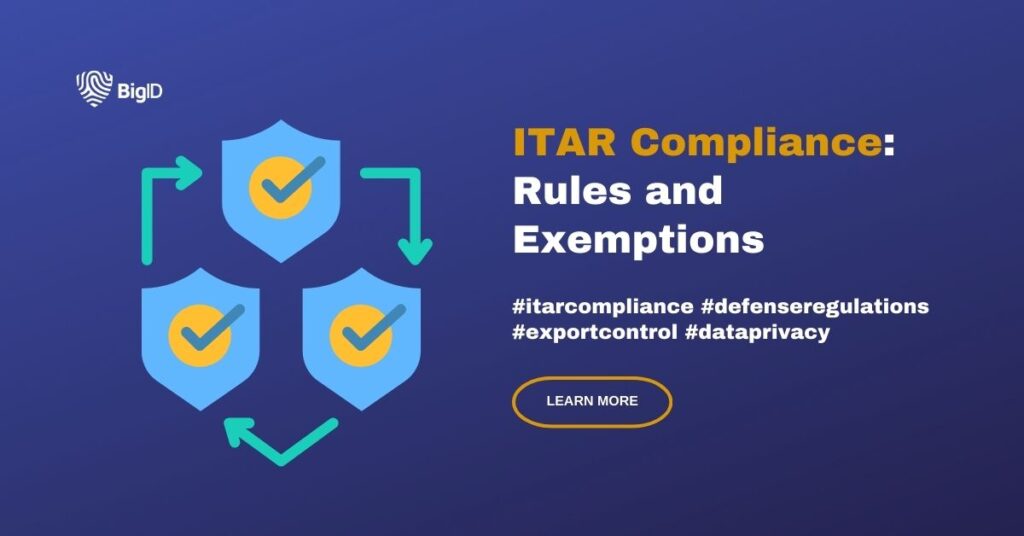ITAR Compliance: Rules and Exemptions for the International Traffic in Arms Regulations
It should come as no surprise that information related to the United States defense industry is highly regulated. This sensitive data, often handled by US military or government organizations, could affect national security or foreign relations — and, as such, can carry extremely high penalties and fines if mishandled.
What is International Traffic in Arms Regulations?
ITAR compliance — or the International Traffic in Arms Regulations — are a set of rules established by the State Department’s Directorate of Defense Trade Controls (DDTC) to control the export of defense-related products, services, and information, as outlined in the United States Munitions List (USML). These regulations are part of Title 22 of the Code of Federal Regulations (CFR), or 22 CFR, which covers foreign relations and interactions.
The main priority of this compliance program is to uphold US national security and foreign policy interests by making sure that sensitive defense items, like technology and info, don’t end up in the wrong hands outside the US. It also controls the distribution of information to a foreign entity, if it relates to defense matters. As such, it provides checklists and imposes restrictions on articles and services that might be sensitive.
This is all in line with the Arms Export Control Act (AECA) to protect US national security, back up foreign policy, and keep a tight grip on defense technologies to prevent them from going where they shouldn’t.

ITAR Compliance Requirements
The ITAR compliance program, enforced by the DDTC, regulates several types of defense articles, defense services, and technical data that the USML defines. Items on the USML include a wide range of military technologies and components that require strict control and oversight. Here is a breakdown of what each category covers.
Defense Articles
While many might think the meaning of “defense articles” is items such as tanks, missiles, firearms, and other weapons, the scope is much broader. The ones enumerated in the USML by the State Department include the following 21 categories:
- Firearms, close assault weapons, and combat shotguns
- Guns and armament
- Ammunition/ordnance
- Launch vehicles, guided missiles, ballistic missiles, rockets, torpedoes, bombs, and mines fall under the export of defense articles regulated by ITAR.
- Explosives and energetic materials, propellants, incendiary agents, and their constituents
- Surface vessels of war and special naval equipment
- Ground vehicles
- Aircraft and related articles
- Military training equipment and training
- Personal protective equipment
- Military electronics
- Fire control, laser, imaging, and guidance equipment
- Materials and miscellaneous articles
- Toxicological agents, including chemical agents, biological agents, and associated equipment
- Spacecraft and related articles
- Nuclear weapons-related articles
- Classified articles, technical data, and defense services not otherwise enumerated
- Directed energy weapons
- Gas turbine engines and associated equipment
- Submersible vessels and related articles
- Articles, technical data, and defense services not otherwise enumerated
Defense Services
The suppliers of defense services under ITAR’s purview fall into three main categories:
- Those who provide assistance to foreign persons on anything related to defense items, including training, design, development, manufacturing, maintenance, etc.
- Those who provide foreign persons with controlled technical data
- Those who provide foreign units and forces with military training
ITAR Technical Data
ITAR applies to three types of technical data as well:
- Information for the design, development, manufacturing of military equipment, including blueprints, drawings, documentation, etc.
- Classified information about the items and services listed above
- Software directly related to defense products

2023 ITAR Amendment
In 2023, the ITAR compliance regulations underwent some changes aimed at streamlining the process for US companies to export defense-related products and services. The changes aim to make the process more efficient and user-friendly while still ensuring the security of sensitive defense-related information.
The proposed ITAR rule adds two new entries to the definition of “activities that are not exports, reexports, retransfers, or temporary imports.” The first entry states that taking defense items outside a previously approved country by foreign government armed forces or UN personnel don’t need to be ITAR compliant. The second entry states that any foreign equipment that enters the US and is subsequently exported under a license or other approval is exempt from reexport and retransfer requirements, as long as it has not been modified, enhanced, or otherwise altered.
Who Must Be ITAR Compliant
Covered entities are not limited to organizations in the defense industry — or government or military organizations. Absolutely any company — public or private — that does business with the US military or deals with information related to items, services, or technical data covered on the USML must comply with ITAR.
Covered parties include — but are not limited to — third-party contractors and companies in the supply chain, including manufacturers, exporters, and brokers for defense articles or information. They also include wholesalers, distributors, and technology companies.
Securing ITAR Data
Securing ITAR data is crucial for companies to prevent unauthorized access or disclosure of sensitive defense-related information. Here are some steps companies can take to secure their ITAR data:
- Access Control: Limit data access to authorized personnel.
- Encryption: Protect data with strong encryption.
- Training: Educate employees on ITAR regulations.
- Physical and Network Security: Safeguard physical and digital data.
- Data Classification: Label sensitive information clearly.
- Incident Response Plan: Prepare for data breaches.
- Legal and Compliance Support: Seek expert guidance.
- Monitoring and Auditing: Continuously oversee data access.
- Secure Communication: Use encrypted channels for data sharing to ensure cybersecurity.
- Vendor and Third-Party Management: Ensure partners comply with ITAR rules.
- Secure Disposal: Properly dispose of unneeded data.

Common ITAR Violations to Avoid
ITAR (International Traffic in Arms Regulations) violations can have serious legal and financial consequences, and they often occur due to a lack of understanding or adherence to these complex regulations. Common ITAR violations include:
Unlicensed Export or Transfer
One of the most prevalent violations involves exporting or transferring ITAR-controlled items, services, or technology to a foreign person or entity without obtaining the required export license. This violation often occurs due to ignorance of the regulations, incomplete paperwork, or failure to recognize that specific items are subject to ITAR controls.
Failure to Obtain Proper Licensing
Whether an entity is aware of the ITAR compliance requirements or not, failure to obtain the appropriate export or transfer license before proceeding with a transaction is a common violation. Each export or transfer of controlled items usually requires a specific license, and not obtaining one is a serious offense.
Inadequate Recordkeeping
ITAR-compliant entities must maintain detailed records of their ITAR-related activities, including export, import, and transfer transactions, as well as licenses and agreements. Violations occur when organizations do not keep accurate and complete records, making it difficult to demonstrate compliance in case of an audit, potentially leading to penalties for ITAR infractions.
Inadequate Security Measures
ITAR-regulated items, information, and technology must be safeguarded against unauthorized access. Violations can occur if entities do not have adequate physical and digital security measures in place to protect sensitive information from being disclosed to unauthorized parties.
Failure to Screen Employees
Companies must screen employees and individuals with access to controlled items to ensure they are US citizens or otherwise authorized to access such materials. Violations occur when individuals without proper authorization gain access to these materials.
Incomplete or Inaccurate Documentation
Inaccurate or incomplete documentation regarding the classification of items, services, or technology, as well as their export or transfer status, can violate ITAR. Failing to classify items accurately or incorrectly marking them can result in non-compliance.
Failure to Report Violations
ITAR-compliant entities are required to report any actual or suspected violations to the appropriate authorities promptly. Failing to intentionally or unintentionally report violations can lead to more severe consequences if discovered.
Foreign National Involvement
Involving foreign nationals, even indirectly, in projects or transactions involving controlled items can lead to violations. Proper procedures for handling foreign nationals in ITAR-related activities must be followed.
International Travel with ITAR Items
Traveling internationally with ITAR-controlled items, such as laptops or related technical data, without the necessary authorizations can lead to violations.
ITAR Exemptions and Exceptions
ITAR does provide certain exemptions and exceptions to its regulations, allowing specific individuals and activities to be exempt from full compliance. Some common exemptions and exceptions include:
- U.S. Government Agencies: ITAR regulations do not typically apply to US government agencies when dealing with defense-related items or information. However, these agencies are subject to their own internal controls, which should align with ITAR best practices.
- Public Domain Information: Information that is already in the public domain, such as published books, articles, and websites, is generally exempt from ITAR controls. However, the line between public domain and controlled information can be complex.
- Fundamental Research: Basic and applied research conducted at accredited institutions of higher education in the United States is exempt from ITAR controls, provided it is intended for publication and does not involve specific defense-related technology.
- U.S. Munitions List (USML) Category XII: Depending on certain conditions, some specific items in USML Category XII (Fire Control, Range Finder, Optical, Guidance, and Control Equipment) may be eligible for exemptions.
- Temporary Exports: Temporary exports of ITAR-controlled items for events like trade shows or exhibitions can be eligible for temporary export licenses.
- Servicing and Maintenance: ITAR regulations may not apply to the routine servicing and maintenance of defense products if they do not involve the transfer of technical data or significant modifications.
- TAA (Technical Assistance Agreement) and MLA (Manufacturing License Agreement): ITAR regulations can be exempted or modified under the terms of a TAA or MLA, subject to approval by the US Department of State.
- De Minimis Rule: If a foreign-made item or system contains only a small percentage of US-origin ITAR-controlled components (typically less than 10% by value), it may not be subject to ITAR controls.
How to Secure ITAR Data with BigID
Any organization subject to ITAR requirements must take concrete steps to secure its defense data and implement a detailed incident response plan in case of a breach of ITAR regulations.
BigID’s automated data intelligence platform enables the government, military, defense, and any company that handles defense equipment or services to identify and secure ITAR data, prevent data breaches, reduce risk, and ultimately become ITAR compliant.
- Identify, Classify, and Know Your Data: BigID’s data discovery foundation drills deep inside all structured and unstructured data, on-prem or in the cloud, with multiple connectors to find sensitive data. This allows organizations to inventory, map, classify, and connect data to ITAR requirements — as well as other regulatory policies.
- Monitor Processing Activities: With BigID, visual data flow mapping shows how data is processed and shared across the enterprise and third parties.
- Reduce Data Access Risk: BigID can flag and investigate high-risk users, groups, and data across an organization. Companies can track and review files containing sensitive data with open access — and produce audit reports of high-risk targets.
- Leverage Risk Scoring: BigID scores risk based on a variety of data parameters like data type and location — and provides a risk-centric view of data so organizations can be proactive about reducing risk while adhering to cybersecurity best practices.
To learn more about how to secure and manage ITAR data to meet compliance— schedule a 1:1 demo with BigID today.



